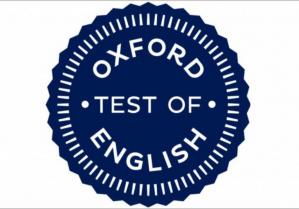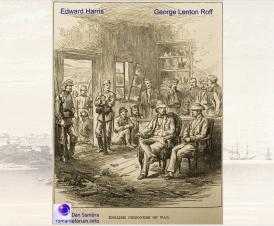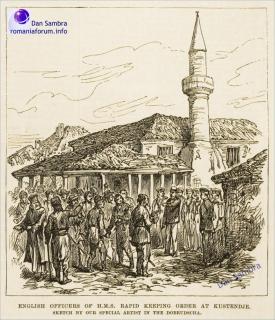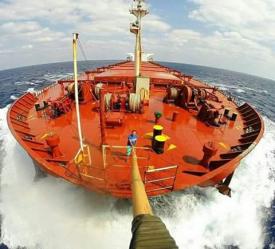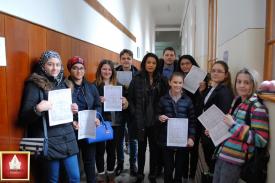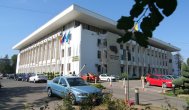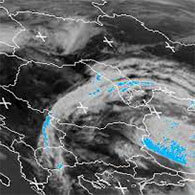Event 4th - KYIV SECURITY FORUM
Event: 4th - KYIV SECURITY FORUM: Changing the Security Paradigm in a Fragmented World. European dimension 1675
Marime text
1675
Marime text
I would like, first of all, to thank the organizers - the Open Ukraine Foundation and the Chatham House - for inviting me to participate in this event.
Security is always a highly topical and challenging theme to discuss, and the moment of our debate - just a few days before major security events such as the NATO Lisbon Summit, which is going to adopt its new Strategic Concept, and the OSCE Summit in Astana - is particularly relevant.
Distinguished audience,
Currently, the international arena faces threats to the peace and security that are different in nature and complexity compared to those from just two decades ago. International terrorism, cyber attacks, piracy, to name just a few of them, have something in common: they are transnational.
Ostensibly, cyber attacks and energy insecurity are able to paralyze a country without moving a single soldier. At the same time, let us remember that recently we have witnessed disruptive events, such as the crisis in Georgia, which had negative impact both on the countries in the region and on the Euro-Atlantic security, reminding us that even "frozen" conflicts can become "hot" again. That means that we face new challenges as well as old.
Furthermore, all these point to the idea that security can no longer be reduced to its military dimension. It embraces political, economic (energy for example), social, environmental, as well as defense components. It is, therefore, more difficult to find a comprehensive and unique conceptual framework to deal with all these parallel and yet interacting phenomena. Every single one of which may have its own theoretical approach, inducing a sentiment of fragmentation. Even more difficult is, in practice, to convene a coherent system of security arrangements to deal with all these factors. Nevertheless, we, in the Euro-Atlantic area, have to a large extent managed to follow this pattern. Among our tools, we are using a broad concept of security, based on a tri-dimensional approach: political-military, economic/environmental and human. We have it in place, and we need to use it to the fullest extent possible. And, where necessary, to adapt it gradually to the new context.
In order to adapt this system, something we agree is needed, we, in NATO and the EU, have started to think on how to better manage the interaction of different actors involved in security area. We came to the conclusion that a gradual increase in cooperation among the multilateral institutions is needed both politically and operationally, as each one has a role to play in accordance with its responsibilities and purposes. Experiences in Afghanistan and Kosovo have shown us that today's security challenges require a comprehensive approach by the international community. So another conclusion was that there are two aspects of such an approach, both of them highly political and at the same time very operational: the first one is linked to the cooperation of different actors involved (international organizations, states, NGOs) and the second one involves civil and military coordination.
Ladies and gentlemen,
Let me go into details on what I mean by the need to adapt rather than to replace the current arrangements, even though, obviously, the security dynamic is evolving.
Currently, the array of international organizations active in security area in the Euro-Atlantic space is impressive. We have first the pan-European organization, the OSCE, with well-established credentials as a cooperative security organization, based on a comprehensive set of principles which guide its activity and, in a sense, regulate the behavior of member states no matter to which defense arrangement they belong. It is a unique forum, which through its so-called "baskets" combines the different dimensions of security in a single matrix, allowing for a comprehensive approach of security.
Beside OSCE, there are NATO and the EU, which for us, as full-fledged members, are crucial in terms of ensuring security. NATO is what we see as the main guarantor of our security. Through their policy of partnerships (such as the those with Russia, Ukraine, Georgia, the EAPC etc.), which irradiate cooperative security beyond their borders, these organizations play an important role in creating conditions for all countries in the Euro-Atlantic area to be secure.
Another layer is that of institutions with specific tasks, such as Council of Europe, which, through its focus on human rights, complements other organizations' activities, particularly in terms of ensuring that a unique set of values guide our countries' internal and international behavior.
I would like to dwell more on NATO and the EU.
In dealing with the current security challenges, NATO and EU are natural partners - they have common interests, common concerns and, last but not least, twenty-one common members. Their simultaneous processes of extension with the countries of Eastern and Central Europe have proved to be an effective instrument for the stabilization of the region, encouraging the political and economic reforms and the consolidation of the whole Europe.
As NATO and EU share the same values and principles (such as individual freedom, rule of law, market economy), both have an intrinsic „soft power" dimension.
One of the questions asked to kick off the debates concerned the idea of the West losing its "monopoly" in soft power. For many countries in Central and Eastern Europe, the people's aspiration for living in an open, democratic society was a powerful vehicle to modernization. There is a real soft power dimension here. But, in my opinion, seeing the soft power in terms of ‘monopoly of the West' or as a mutually exclusive competition is somehow misleading. We are not talking about geopolitics here, be it in hard or soft terms. The important thing is that we are not only proclaiming our fundamental values, but actually live by those values. NATO or EU are not in any process whatsoever of giving up these values. Whether "soft" or not, this power is not a drive towards imposing on some others our will. It is rather about leading by example, about others wishing to replicate our "style" by adopting our fundamental values and internalizing them.
It is not about excluding anyone either. On the contrary, every member of the Euro-Atlantic space is and should remain included in this cooperative approach.
I am deeply convinced that solidarity and cooperation between Europe and the USA are as important today as they were during the Cold War. Under the threat of global challenges such as terrorism or proliferation of weapons of mass destruction, the permanent dialogue and cooperation are a must. The presence of the United States in Euro-Atlantic cooperation formats in the field of security remains crucial for the security and stability of our continent.
Furthermore, we can see recently a salient interest of European and Euro-Atlantic partners to develop cooperation and coordination with Russia. Romania is open to the finding new ways to cooperate with Russia, and is willing to contribute to building an authentic partnership, founded on common values and shared principles.
The same is true of our approach to cooperation with other countries, too. I would give an example related to the Black Sea area, which is of strategic importance for Romania.
Distinguished audience,
As we all know, security is also a matter of perception, and I believe that the countries situated, in geographical terms, at the periphery of the Euro-Atlantic Area might be more aware about certain challenges emerging from those regions. Because, in this, case, geography does matter.
The enlargement of NATO and the EU with Romania and Bulgaria has moved their frontiers to the Black Sea shore. The Black Sea area still remains a crossroads of geostrategic interests and politically competing trends, of emerging security threats and new opportunities - from so called "frozen" conflicts to vital energy corridors. Romania has constantly advocated for the EU and NATO to maintain the Black Sea area on their "radar screens", through political dialogue, partnerships and situational awareness.
Some interesting instruments of both EU and NATO can be used in this respect. I would mention first the Black Sea Synergy, a format with a very good potential, but also the Eastern Partnership, which is also important, provided that both instruments become more ambitious and pragmatic.
We are interested to strengthen cooperation by finding political common denominators in regional areas of interest - and there are not few: democracy, human rights, governance, border management, protracted conflicts, energy, transports, environment, maritime policy, trading, education, research and development.
I strongly believe that the cooperation process can bring about a decisive change in the regional culture of dialogue, able to improve confidence building, extend the grounds for mutual understanding between regional societies, and resulting in a safer and more stable regional security environment. EU's constant interaction and cooperation with major regional actors, such as Ukraine, Russia and Turkey, as well as an open, pragmatic dialogue, including on the divergent issues, is absolutely necessary for the stabilization of the region.
During its presidency in office of the Organization for Black Sea Economic Cooperation, in the first half of 2011, Romania will support the focus of the organization on the real and pragmatic necessities of the member states. We will support, in this context, projects able to contribute to the strengthening of the democratic institutions, to the economic development, as well as to the EU aspirations - where they exist - of the members states. We will promote, in the same spirit, a better coordination between the initiatives of the organization and those of the European Union.
Distinguished audience,
In multilateral framework, there are some important processes and events worth mentioning in the field of security. Within the EU, we are in the middle of adapting, including at the institutional level, the implications that the entry into force of the Lisbon Treaty brings to the Common Foreign and Security Policy.
Beyond that, we will have this year two important events: the NATO Summit in Lisbon and the OSCE Summit in Astana.
NATO's Lisbon Summit will be the Summit of the New Strategic Concept - a crucial moment to strengthen unity of purpose and views of the Allies in a context of increased international uncertainty and financial constraints. Romania's vision is that of a strong and united transatlantic Alliance, capable to tackle regional and global security challenges in a comprehensive manner and in cooperation with other partners and international organizations.
After that, the OSCE Summit in Astana should represent a renewed impetus for the activity of the Organization, as well as a restored commitment to its values and principles. So, it will be a credibility test for the Organization. A new strategic vision should be launched at the Summit - encompassing all three dimensions of the OSCE activity and shared by all participating States in order to turn it into reality.
The Summit in Astana should capitalize the debates and ideas that steamed out of the Corfu process - an ongoing one that should remain the main framework for the debate on pan-European security - with a view to enhancing the existing security architecture. The Summit should also reinforce the OSCE comprehensive approach of security and should deliver a visionary Action Plan, with specific tasks in all three dimensions.
Tackling openly the resolution of the existing protracted conflicts in the OSCE area is critical. Reaching substantive progress with a view to agreeing long-lasting solutions for the protracted conflicts within the OSCE - including the one in the Republic of Moldova - represents a priority for Romania.
As you can see from this overview, there is a lot on our plate.
Ladies and gentlemen,
Yes, we are facing a fragmented and evolving world, with new and old challenges. Yet we are lucky enough to have, as well, the toolkit needed to deal with them, provided we use arrangements in place to their fullest potential. The OSCE's three-dimensional concept of security, the full respect of democratic values and of the fundamental principles that shaped the current security arrangements, and last but not least, the fulfillment of our commitments, are the key ingredients for coping with the challenges today, with the trans-national character of threats which blurs the distinction between defense and security, between national and European.
The indivisibility and the multi-dimensionality of security is a fact of life which will constrain and shape our decisions about present and future. To respond to those challenges, it is essential that all international actions exceed the concept of territoriality and spheres of influence and maintain a co-operative approach to security.
I will stop at this point, and I am looking forward to your comments.
Thank you.
Urmareste-ne pe Grupul de Whatsapp
 Fondul Documentar Dobrogea de ieri și de azi
Fondul Documentar Dobrogea de ieri și de azi



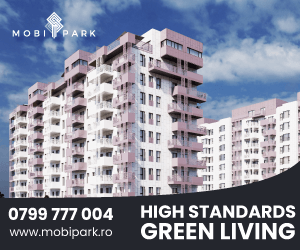

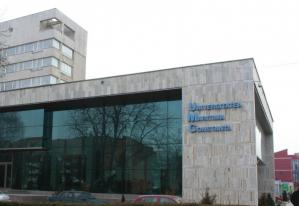
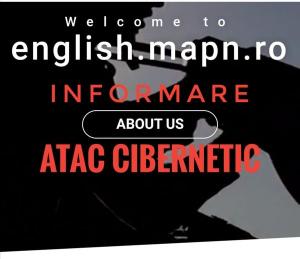
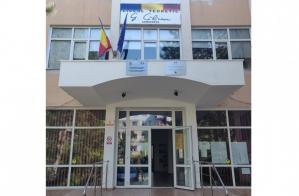
_thumb2.jpg)

